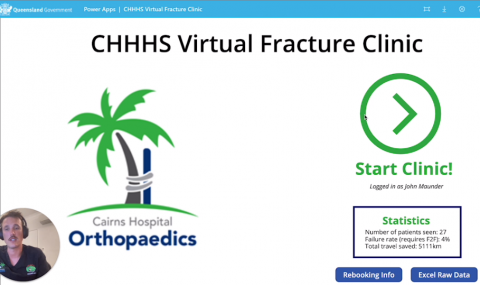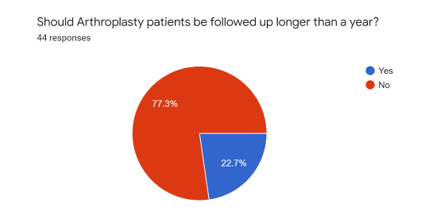Latest News
2024 GRANT APPLICATIONS EXPANDING
We are pleased to announce that 2024 QORF Grants will be open to all musculoskeletal researchers in Queensland – provided an AOA QLD member is listed on the project. It is hoped that the expanded criteria will promote collaboration with the wider MSK research community.
Read More >Read the 2023 QORF Annual Report
The 2023 QORF Annual Report is now available. Thank you to all for a rewarding and productive year. We look forward to continued growth and to further developing Queensland into a musculoskeletal research hub.
Read More >
Will a validated dynamic short-form outcome measure improve patient responsiveness: A National Anterior Cruciate Ligament (ACL) Injury Registry in Australia
Jon Anderson
Orthopaedic Surgeon
University of Queensland
This research comprises part of my PhD investigating ACL PROMs and the development of a new measure to improve patient responsiveness. The outline of my thesis was presented at the September AOA Queensland Branch meeting with the generous support of QORF.
Read More >QORF Strategic Plan 2022-2024
QORF is pleased to present the QORF Strategic Plan 2022-2024
Read More >Silent Auction - Wander at the Overflow 1895 - Congratulations
Congratulations to Dr Matthew Hope! Thank you for your support of MSK research in Queensland. We are sure you will enjoy your stay at Wander at the Overflow 1895, Scenic Rim.


Read More >
Topical antibiotics in ankle fracture surgery (TAAFS) study
Grant Menegon
Training Registrar
Cairns Hospital/Townsville Hospital/RBWH
The topical antibiotics in ankle fracture surgery (TAAFS) pilot study is a multi-centre, prospective, double-blinded, placebo control, randomized controlled trial comparing standard surgical fixation of ankle fractures with and without local topical antibiotics administered at the time of wound closure. The aims of this pilot study include determining the prevalence of both deep and superficial surgical site infection (SSI) according to the centre for disease control and prevention (CDC) definition as well as fracture related infection definition.
The Royal Brisbane & Women’s Hospital, Cairns Hospital and The Townsville University Hospital are the 3 pilot sites. The sample size for this pilot study will consist of 332 patients, spread across the 3 sites. The authors thank the Queensland Orthopaedic Research Fund for funding this pilot study and making this research idea possible.
Read More >
Implementation of a Far North Queensland Virtual Fracture Clinic: the patient’s experience
John Maunder
PHO
Cairns Base Hospital
Cairns hospital provides orthopaedic care to patients spread over 1000km in some of Australia’s most remote regions. 60% of patients reviewed in our fracture clinics do not live in Cairns, some travelling all the way from Thursday Island. More than half of our patients are discharged on their first review. Such travel is inconvenient for patients, and expensive for hospitals (up to $12,000/patient).
Implementing a virtual fracture clinic (VFC) proposes a solution by identifying patients with injuries that have strong evidence to support exclusively non-operative management and managing them remotely with education via telephone.
Currently, there is no literature evaluating VFCs in a rural or regional setting, there is no quantification of PROMs in Australia, and no summation of travel saved (km/$/CO2). Our prospective cohort study will answer these questions.
Progress is currently pending ethics approval. I have created an app to prospectively collect data and distribute education via SMS to patients automatically – a novel use of technology to both improve patient care and reduce staff requirements to implement a research project.
I look forward to updating the QORF team as I progress, and I thank them for both the grant, and the opportunity to present at the recent AOA Queensland Branch meeting and AOA Knowledge Summit.
Read More >Antibiotic coated rods: a 15-year experience of Indications, Surgical Techniques and Clinical Outcomes
Andrew Foster
PHO
Royal Brisbane and Women's Hospital
Antibiotic coated rods (ACRs) composed of polymethyl methacrylate (PMMA) are used to osteomyelitis. This technique allows the application of local antibiotics while also providing a stable biomechanical environment to facilitate both infection eradication and bony union. Conway et al. have reported the largest case series to date, treating 110 patients in a single centre with a limb salvage rate of 100% for long bone osteomyelitis. Further data however is scarce, with the recent International Consensus Meeting on Musculoskeletal Infection giving a strong consensus that there is limited evidence regarding the indications and outcomes following the use of ACRs. The Royal Brisbane and Women’s Hospital (RBWH) has been using this technique over the past 15 years, which would represent the largest case series to date. Our aim is to describe the indications, surgical techniques and clinical outcomes following the use of an ACR.
Read More >Arthroplasty patient follow up - When should we stop?
 Ahmed Mahmoud
Ahmed Mahmoud
PHO
Princess Alexandra Hospital
The project has passed major milestones in answering the research question. The team has completed data collection and has performed the data analysis. The project has gather interested from the orthopaedic community. The data from the project has helped change clinical practice at the Princess Alexandra hospital and is allowing early discharge of patients after arthroplasty procedures. The changes implemented led to improved patient care and major cost saving. The research has been presented at the Princess Alexandrea Hospital orthopaedic show case, the Queensland orthopaedic physiotherapy planning day (invited) and the Royal College of Surgery annual scientific meeting. The project has several arms:
- Survey of orthopaedic surgeons: 44 Orthopaedic surgeons have completed the survey regarding their opinion of arthroplasty patient follow up. We found that most surgeons suggest discharging patient at the one-year mark post operatively (figure). The data has been presented as a poster at the RACS Annual Scientific Meeting 2022.

- Retrospective review of arthroplasty clinic: The data collection was completed. The study demonstrated that most clinical reviews were of asymptomatic patients and did not change management. The data has been presented as a poster at the RACS Annual Scientific Meeting 2022.
- The cost analysis of arthroplasty follow-up: The costs of individual clinical item numbers has been gathered and we are currently performing the data analysis.
Our next goal is to present the project at the AOA ASM and publication.
Read More >The Spectrum of Infective Organisms in Orthopaedic Surgery in Queensland – Geographic and Temporal Trends
Luke Visscher
PHO
Redcliffe Hospital, Queensland, Australia
This is a large-scale data collection and linkage project, that seeks to collect information about all procedures for infected hip, knee and shoulder arthroplasty and microbiology results in Queensland across all orthopaedic hospitals.
The study design has been finalised and ethics approval based on that plan has been approved, and revised a number of times. The researchers have been working closely with the clinical excellence team on validating a method for data analysis and state wide collection in the back end of QLD health data silos. This has proven possible, although there have been some difficulty in prioritising software tweaks that would optimise the process. Given the scale of the project across all QLD hospitals, and the need for data export from state wide databases, the approval of 4 executive directors is required before progression to SSA and public health approval. The approval process for such a large scale study is rigorous. We are at the stage now where the method has been proven possible to execute, and are awaiting final approval before PHA submission. It has been shown that the method for the study is possible, and we should be able to rapidly progress once the final approval has been given. We look forward to gathering this data and presenting it at future local meetings.
Read More >.png)
Immediate joint infection diagnosis using bed-side iPhone live imaging
Sebastien Stephens
PHO
Gold Coast University Hospital
Joint infections are morbid, costly and most importantly, difficult to diagnose especially in the rural/remote general practice setting. We propose a system of simple optical beads attached to an iPhone to immediately identify live bacteria with a single drop of joint aspirate.
We developed a cleanable, pocket-size device which permits to see microorganisms immediately. Testing has proven robust with video footage showing live bacteria with the iPhone set to video mode. However, the device has limitations with resolution and autofluorescence. Thus, we are still in the process of establishing sensitivity and specificity of the device in the lab environment. With basic/optical science hurdles ironed out, we will continue to, as planned, into the human pilot trial.
Read More >

.png/Annual%20Report%202022-2023%20(1)__240x320.png)